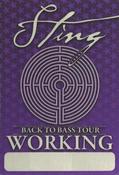
Sting, yesterday in Lille: the former policeman's flawless performance...
While a compilation album retracing his twenty-five-year solo career was released this winter.
Sting was at the Zénith last night for one of the French stops on his Back to Bass Tour. A tour that feels like a return to his favourite instrument for the man who hadn't been seen armed with his bass since The Police reformed in 2007-2008. To the fundamentals too. A return to his roots, without artifice, which was first reflected in a scenography limited to the simple black of the stage and white lighting. In the choice of his line-up as well. A raw formula: bass, drums, two guitars (Miller senior and junior), and two violins - special mention to Peter Tickell who sparkled on 'Never Coming Home' and 'Love Is Stronger Than Justice'. Finally, in the choice of his repertoire.
The concert's opening song, 'All This Time,' served as a reminder of how many hits Sting had written over a quarter of a century. He could easily have played 22 of them—the same number as the set list. Demanding, the artist did not give in to the easy way out. The sixty-year-old, who since 2003 and the release of his last album of personal compositions has accustomed his audience to taking him where they don't expect him - we remember his albums of baroque music or traditional songs about winter - took, yesterday again, side roads, drawing on lesser-known titles from his repertoire and relegating The Police's songs to the background, except for the end of the set. To the 4,000 spectators - Sting himself had wanted to calibrate the Zenith's capacity - the artist will still have offered five songs from his old brigade, including two excellent versions of 'Next To You' and 'Driven To Tears', before sending a sublime 'Message In The Bottle', alone on acoustic guitar, as a final encore. We can nevertheless regret certain dead ends and a lack of imagination, yet underlying in his words - always in French, please! - a copy too clean through sobriety. This is despite the quality of the reorchestrations giving a beautiful patina to a repertoire which, like its author, has the merit of not having aged a day.
(c) La Voix De Nord by Romain Musart
03082012
SET LIST
- All This Time
- Every Little Thing She Does Is Magic
- Seven Days
- Demolition Man
- I Hung My Head
- I'm So Happy I Can't Stop Crying
- Stolen Car (Take Me Dancing)
- Driven To Tears
- Fortress Around Your Heart
- Fields Of Gold
- Sacred Love
- Ghost Story
- Heavy Cloud No Rain
- Inside
- Love Is Stronger Than Justice (The Munificent Seven)
- The Hounds Of Winter
- End Of The Game
- Never Coming Home
- Desert Rose
- Every Breath You Take
- Next To You
- Message In A Bottle





